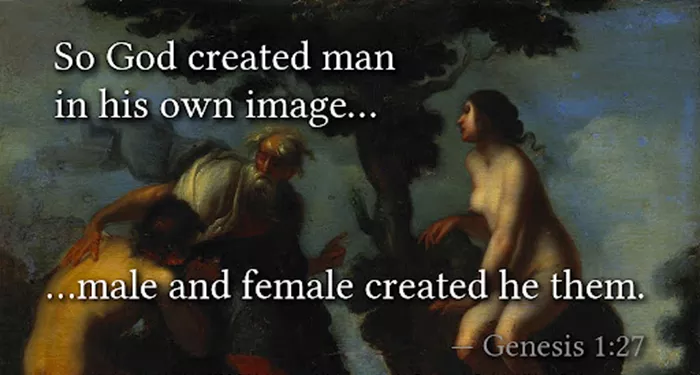Read the Daily Bible Verse – Genesis 1:27 To Strengthen Your Spiritual Journey.
Genesis 1:27 is a profound and pivotal verse within the Christian tradition. It encapsulates fundamental aspects of humanity’s creation and purpose, providing insight into the divine intention behind human life.
Genesis 1:27 KJV Background
Genesis 1:27 reads in the King James Version (KJV): “So God created man in his own image, in the image of God created he him; male and female created he them.”
This verse is situated within the creation narrative of the Book of Genesis, the first book of the Bible. Genesis recounts the creation of the world by God over a period of six days, with the seventh day being a day of rest. Genesis 1:27 specifically addresses the creation of humanity, marking the culmination of God’s creative work.
See Also: Genesis 1:23 Meaning
Historical Context
Genesis was traditionally attributed to Moses, although modern scholarship often regards it as a composite text with contributions from multiple authors and redactors over centuries. The creation narrative is set against the backdrop of ancient Near Eastern cosmology, where various cultures had their own creation myths. In contrast to these polytheistic accounts, Genesis presents a monotheistic view of creation, emphasizing that a single, omnipotent God is the origin of all life.
Genesis 1:27 Meaning
The verse highlights several key theological concepts:
1. Creation in the Divine Image: The phrase “in his own image” (Hebrew: tselem), indicates that humanity reflects certain aspects of God’s nature. This concept implies inherent dignity and worth in every person, as they are created to bear God’s likeness.
2. Male and Female: The mention of both male and female underscores the completeness of humanity’s creation. It affirms that both genders are made in God’s image, emphasizing equality and mutual respect.
3. Theological Implications: Theologically, being made in God’s image suggests that humans have the capacity for rational thought, moral judgment, creativity, and relationality, mirroring divine attributes. It also implies a special relationship between God and humanity, one characterized by purpose and responsibility.
Genesis 1:27 Application in Life
Understanding Genesis 1:27 has profound implications for how individuals and societies view human identity and relationships:
1. Human Dignity and Equality: This verse affirms the intrinsic worth of every person. It provides a foundation for the concept of human rights and the ethical treatment of individuals, regardless of race, gender, or status.
2. Gender Relations: By affirming that both male and female are created in the image of God, Genesis 1:27 promotes gender equality and respect. It challenges societal norms that have historically marginalized women and calls for an equitable relationship between men and women.
3. Responsibility and Stewardship: Being made in God’s image also entails a responsibility to care for creation. Humanity is called to steward the earth and its resources, reflecting God’s creative and sustaining power.
Comparison with Other Biblical Texts
Genesis 1:27 is not an isolated verse but is part of a broader biblical narrative that includes various references to the concept of being made in God’s image:
1. Genesis 9:6: After the flood, God reaffirms the importance of human life by stating that anyone who sheds human blood will be held accountable, for “in the image of God made he man.” This reiterates the sacredness of human life established in Genesis 1:27.
2. James 3:9: The New Testament reflects on the implications of being made in God’s image, noting that it is inconsistent to bless God and curse human beings, who are made in His likeness. This highlights the moral and ethical responsibilities that come with the divine image.
3. Colossians 3:10: The Apostle Paul speaks of the renewal of the believer’s nature in the image of the Creator, implying a restoration and transformation to align more closely with the divine image.
Modern Relevance
Genesis 1:27 continues to resonate deeply in contemporary discussions about human identity and social justice:
1. Human Rights and Social Justice: The assertion that all humans are created in the image of God underpins modern human rights movements. It provides a theological basis for advocating against discrimination and inequality.
2. Environmental Stewardship: The call to care for creation is increasingly relevant as environmental concerns become more pressing. Genesis 1:27 encourages responsible stewardship of the planet, aligning with contemporary ecological ethics.
3. Interfaith Dialogue: The concept of being made in God’s image can serve as a common ground in interfaith dialogues, fostering mutual respect and understanding across different religious traditions.
Conclusion
Genesis 1:27 is a foundational text that provides profound insights into the nature of humanity, gender relationships, and divine purpose. Its declaration that humans are made in the image of God affirms both the inherent dignity of every individual and the responsibility to live in accordance with this divine likeness.
By reflecting on this verse, one gains a deeper appreciation for the ethical, social, and spiritual dimensions of human life and its place within the broader creation narrative.
Genesis 1:27 Commentary
Commentaries on Genesis 1:27 often emphasize the theological and ethical implications of being made in God’s image. Scholars and theologians explore how this concept informs our understanding of human nature, morality, and purpose. The image of God (imago Dei) is viewed as a fundamental aspect of human identity, influencing various aspects of Christian doctrine and practice. This understanding is critical for interpreting the broader themes of creation, redemption, and human responsibility within the biblical narrative.
Genesis 1:27 stands as a testament to the value and potential of every human being, inviting a thoughtful and respectful approach to issues of dignity, equality, and stewardship.


